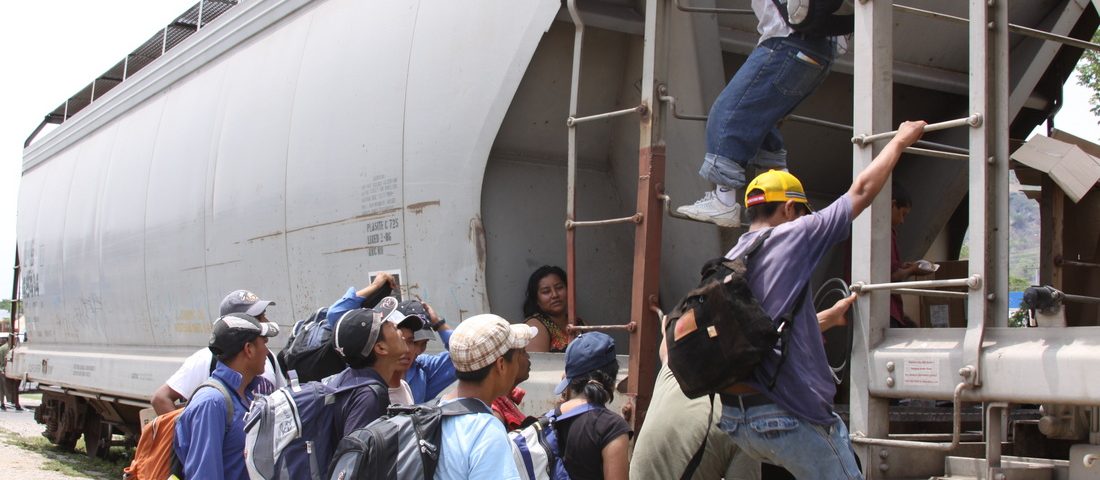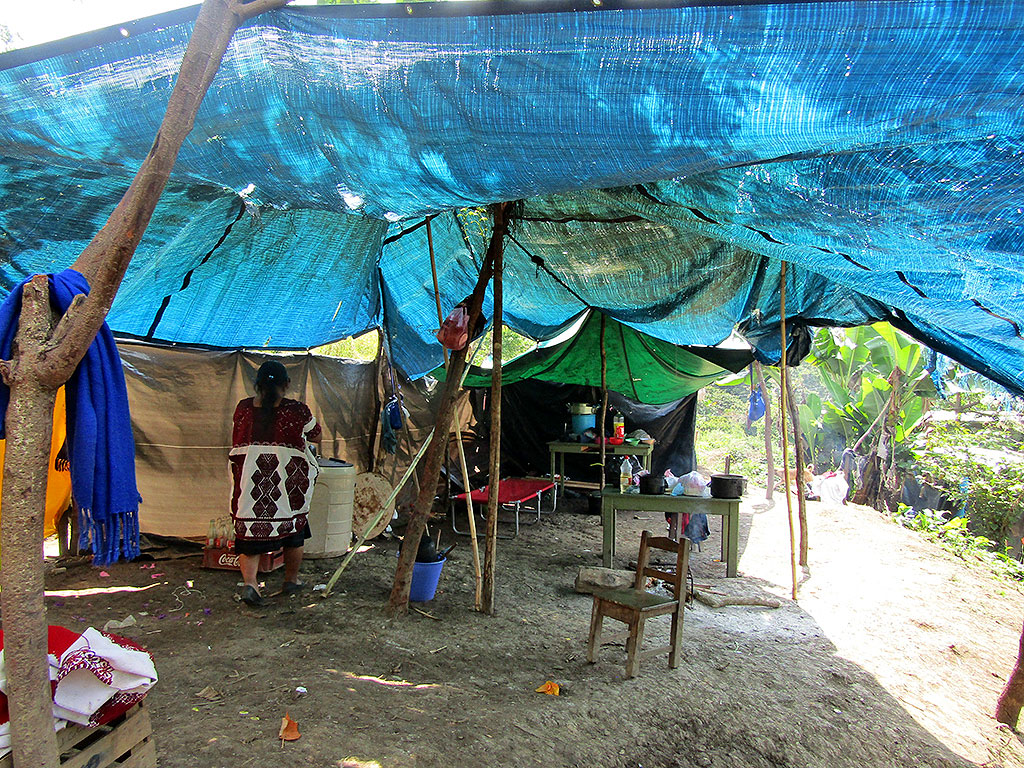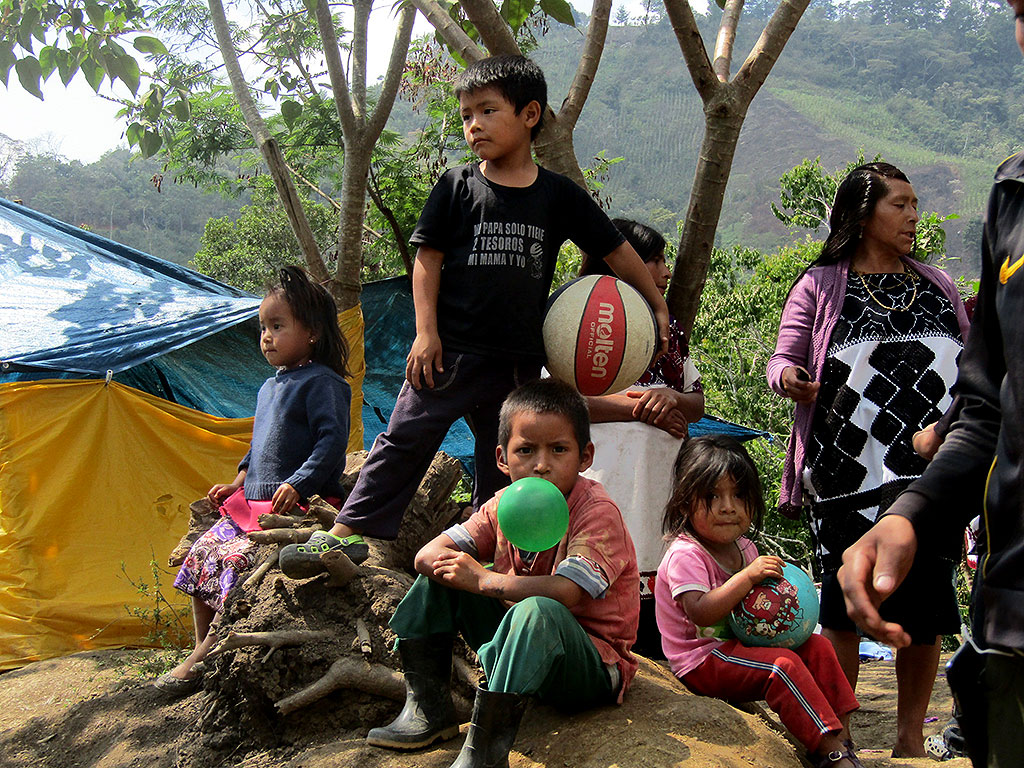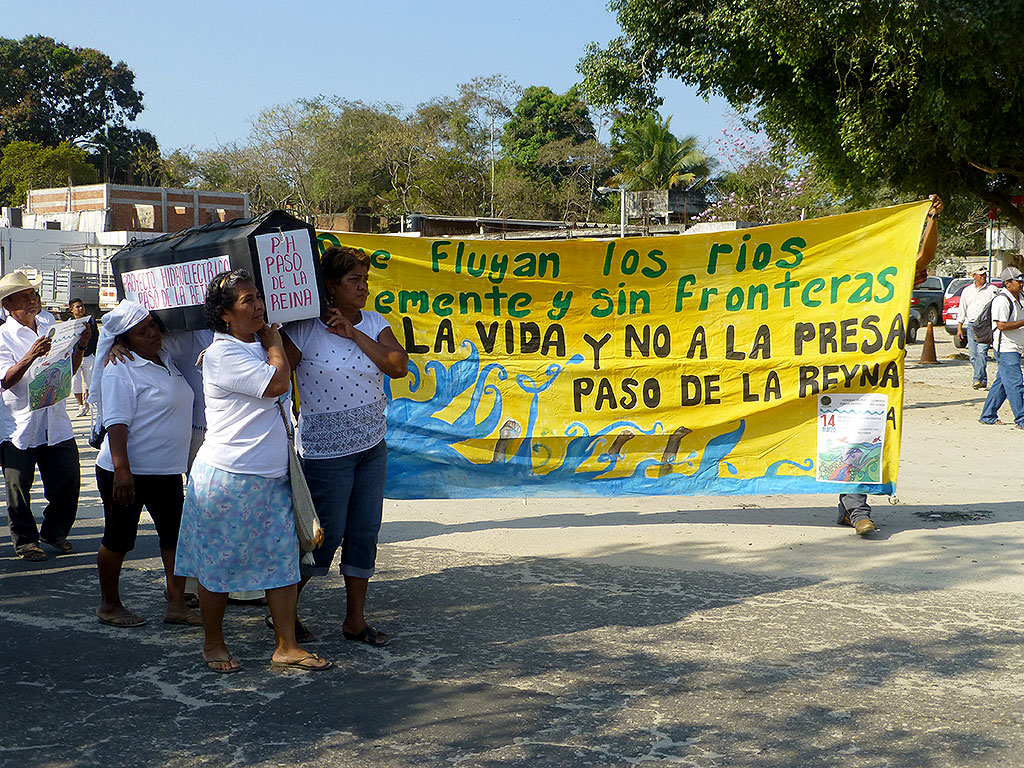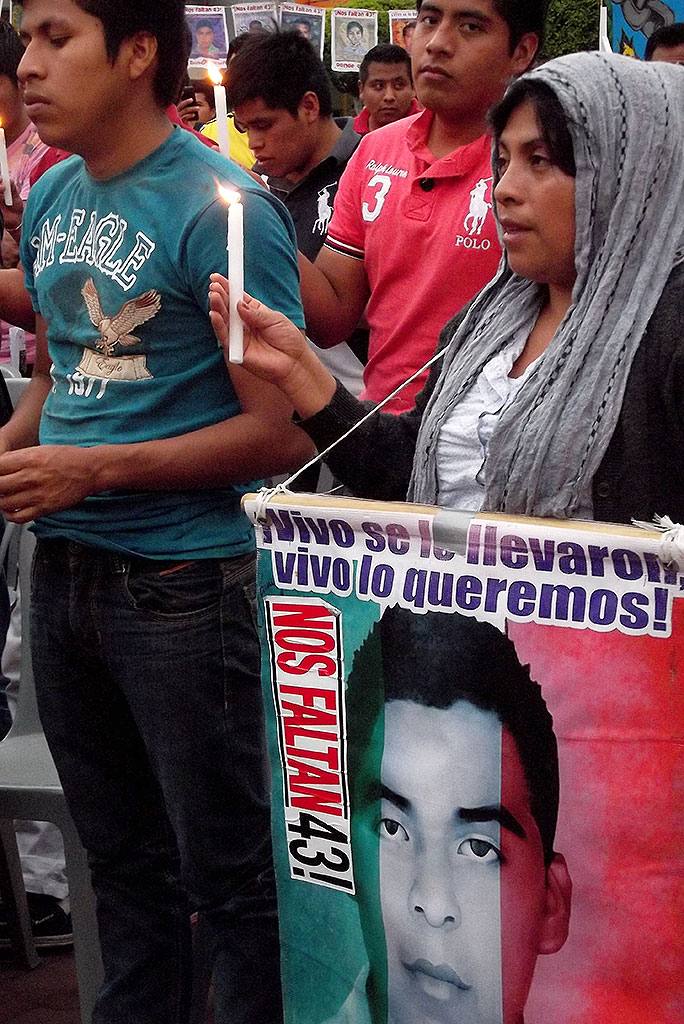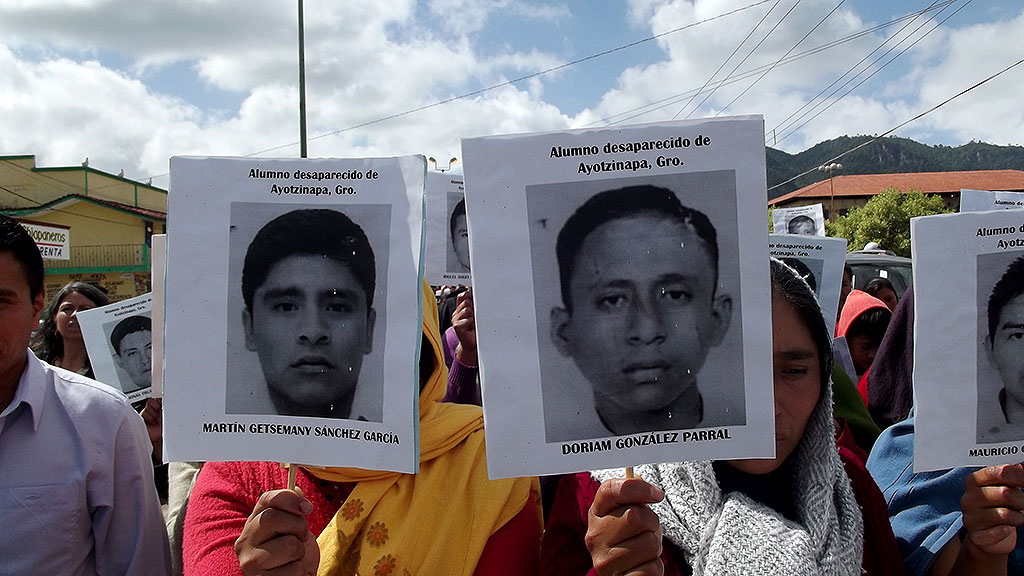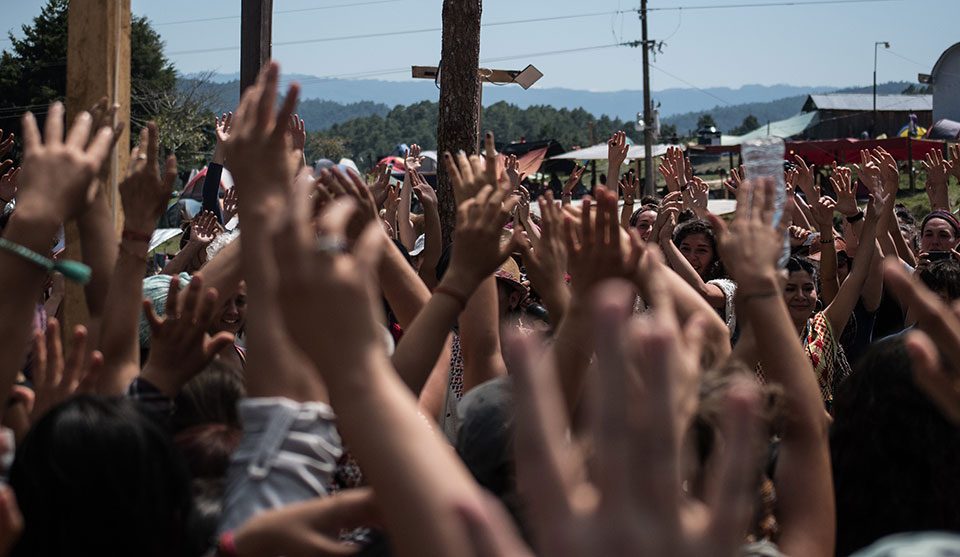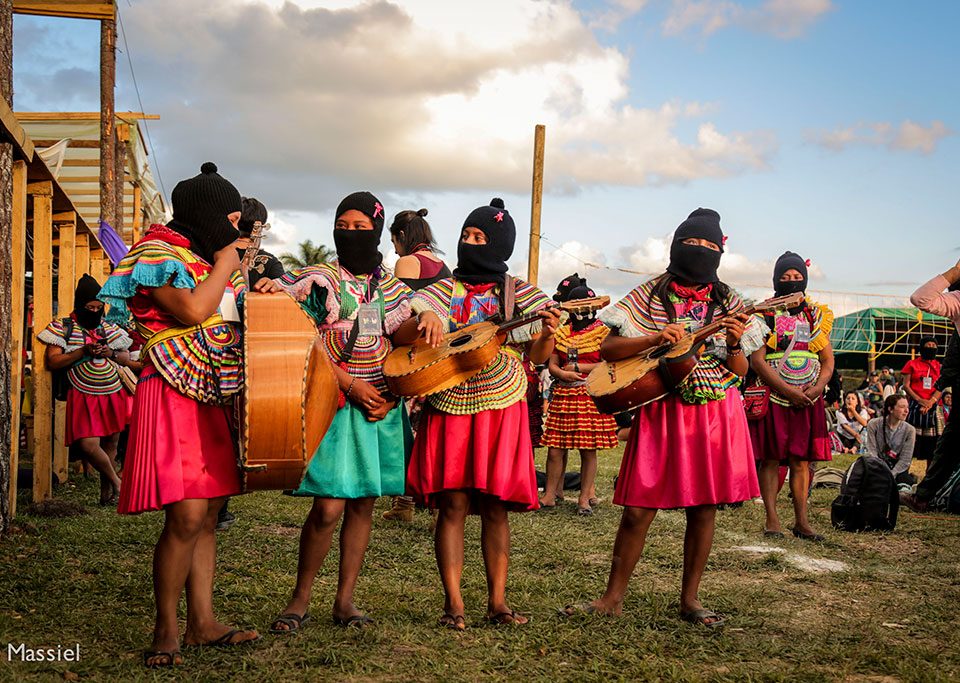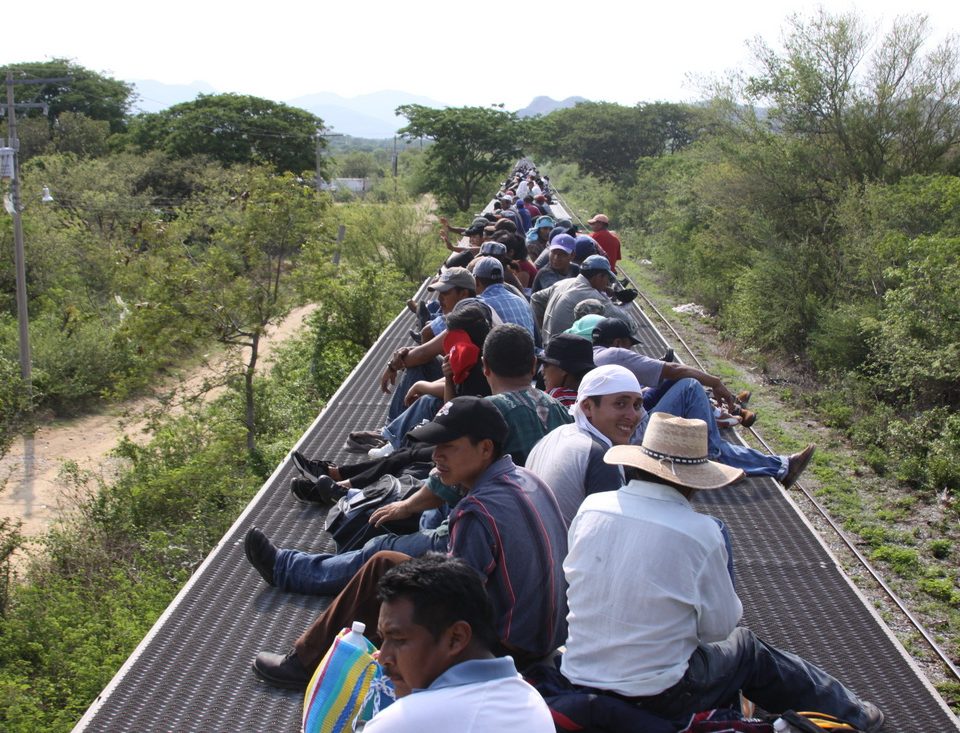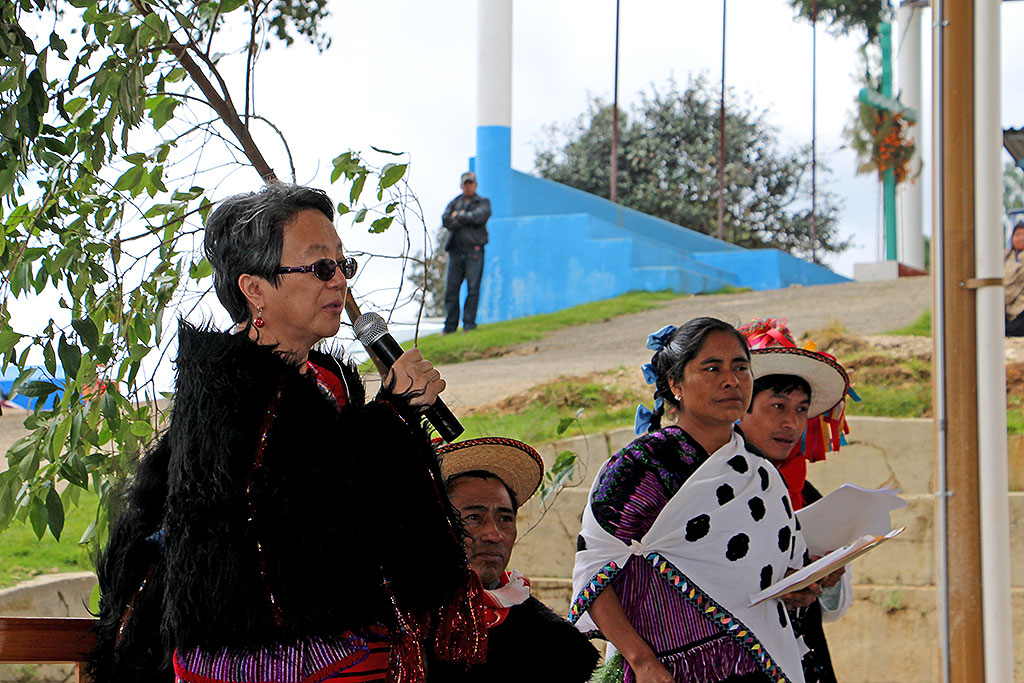
SIPAZ Activities (mid-November, 2017 to mid-February, 2018)
02/04/2018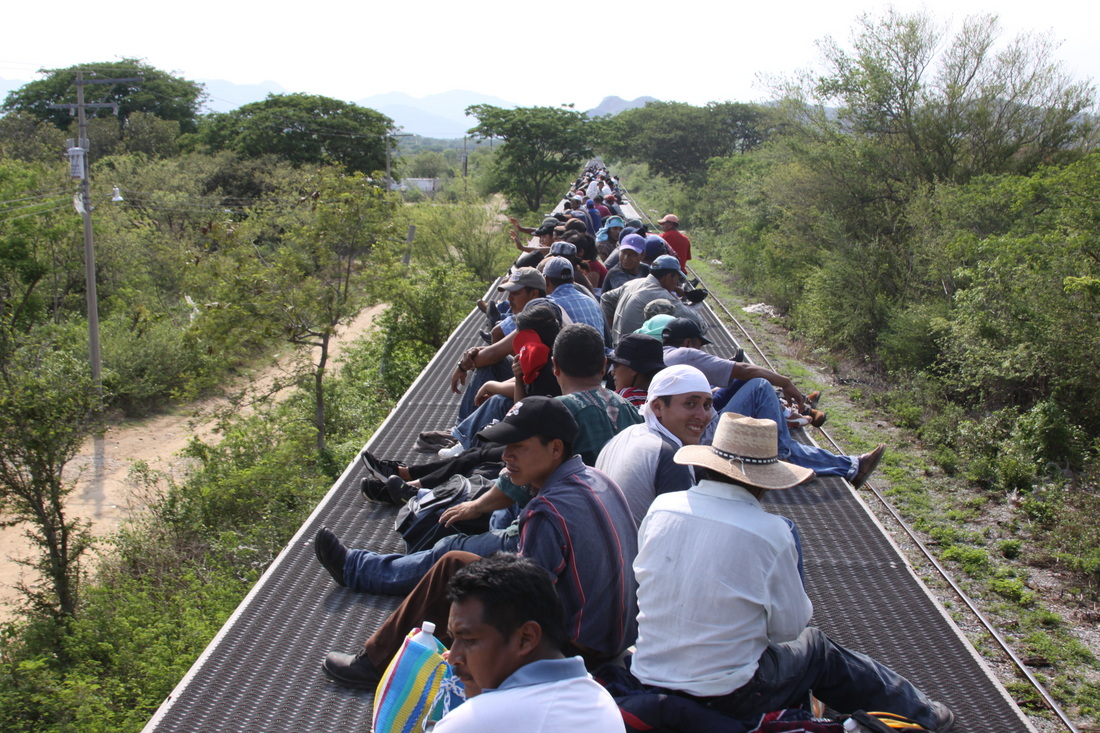
FOCUS: Migration policy in Mexico and the United States – different discourses, similar strategies
14/07/2018In April, the Senate ratified the Comprehensive and Progressive Agreement for Trans Pacific Partnership (TTP-11 or CPTPP), Mexico being the first country of those participating to do so. The business sector welcomed the perspective of this agreement: “The countries that are part of the CPTPP make up 14% of the annual production of the whole world, with which they become one of the largest free trade zones at international level. This agreement opens the doors to ten Pacific economies to Mexican producers and entrepreneurs.”
On the other hand, the Convergence of Social and Citizen Organizations demanded “that this Treaty not be ratified and negotiated in our name without transparency and without citizen participation.” It requested an audience with the Senate “to express their perspectives and alternatives to the contents of the Treaty that compromise human rights and the care of the land. Unfortunately to date we have not been received.”
It attributed the hurry “to the fear of the current government that with the elections of July the composition of the Legislative Power changes and whoever wins the presidency does not endorse the TTP-11.” In addition, it said that “it is feared that with the same hurry and before the new government and the next legislature take office, the recently concluded modernization of the Free Trade Agreement between the European Union and Mexico (TLCUEM in tis Spanish acronym) will be approved as well as the renegotiation of the North American Free Trade Agreement (NAFTA).”
Mexico, immigration filter
At the end of March, some 1,500 migrants, who fled their countries due to violence, started the “Viacrucis Migrante 2018” Caravan, which gained wide media coverage after it aroused the ire of US President Donald Trump, who used them as an example of the weakness of the borders, called to block them and mobilized troops to the border. He threatened that, “the source of NAFTA benefits (…) is at stake, as well as foreign aid to Honduras and other countries that allow it.” In April, the Mexican government announced that it would multiply the numbers of the National Gendarmerie on the southern border while, it said, maintaining the commitment to protect the rights of migrants. 84 organizations and networks of 23 Mexican states demanded that the plan be canceled. They considered that “without a doubt it will result in a new increase in violence, xenophobia and criminalization of migrants, refugees and those who defend them, as well as the population in general.”
In May, networks and organizations defending migrants expressed “indignation, concern and estrangement in the face of the information (…) pointing to an agreement in word to turn Mexico into a filter for asylum seekers in the United States and as a detention center for migrants.” They demanded that, “dialogue on the matter with the United States be suspended (….). Human rights cannot be negotiated as a bargaining chip in any commercial treaty ” (see main article).
2018 Elections: Much at Stake Amid High Levels of Violence
The 2018 presidential campaign, as well as elections campaigns for the new the federal legislative power, various state congresses, governorships and mayoralties have already formally begun. With 18,311 public positions contested, it is the first time that so many are elected in a single process and which has been characterized by high political violence. From the end of 2017 to the middle of May, 94 candidates from all the parties were killed, 305 attacks against politicians took place and, among other reasons due to pressures from organized crime, more than a thousand refused to participate. Guerrero had the highest number of murders with 21 cases, followed by Oaxaca (16), Puebla (10), Veracruz (8) and Mexico State (7). Attacks have increased by 400% compared to previous elections.
Andres Manuel Lopez Obrador (AMLO) will preside over the National Regeneration Movement (MORENA), the Labor Party and the Social Encounter Party (PES); Ricardo Anaya, for the National Action Party (PAN), the Democratic Revolutionary Party (PRD) and the Citizen Movement; Jose Antonio Meade for the Institutionalized Revolutionary Party (PRI), the Green Ecologist Party of Mexico (PVEM) and Nueva Alianza; and Jaime Rodriguez Calderon, “El Bronco”, as an independent candidate. Surveys place candidates in this order, with a relatively broad margin of advantage for AMLO. Partly because of this, he has become the common target of the other candidates. In May, Margarita Zavala announced the withdrawal of her independent candidacy, recognizing that she had no chance of winning, and making it clear that she does not decline in favor of any candidate.
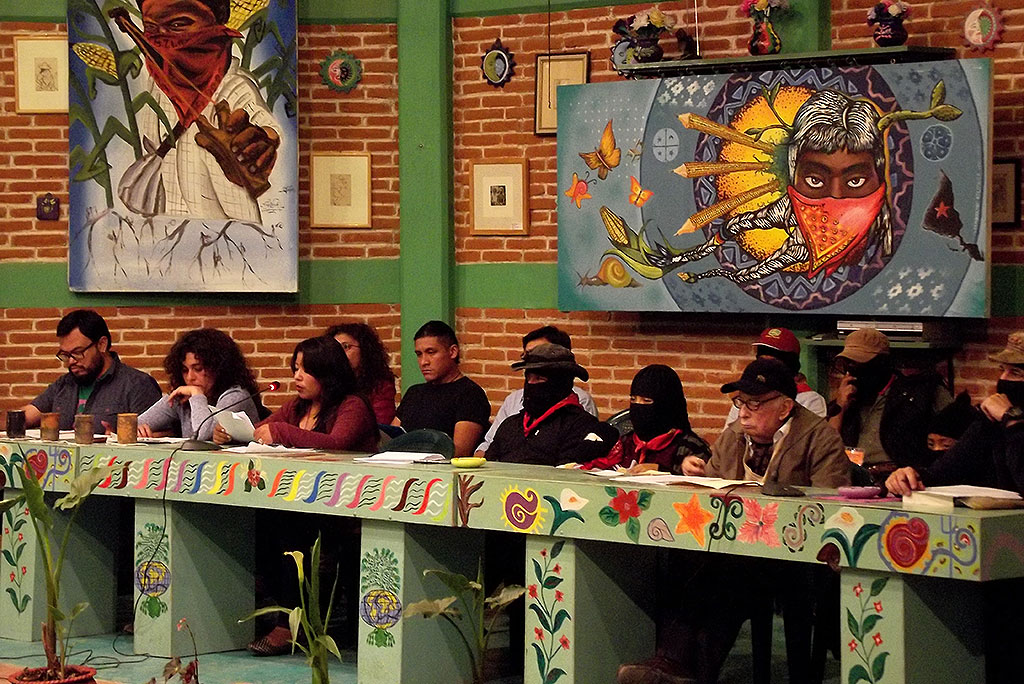
“To Watch, to Listen, to Speak: No Thinking Allowed?”, convened by the Zapatista Army of National Liberation (EZLN) in Chiapas, May 2018 © SIPAZ
On another note, in May, the National Indigenous Congress (CNI), the Indigenous Council of Government (CIG) and its spokesperson, Maria de Jesus Patricio Martinez, “Marichuy”, announced that they will not “seek or accept any alliance with any political party or candidate.” They said that they will not call to vote or to abstain, but that they will continue to look for “all those below to dismantle the pestilent power from above: vote or not vote, get organized.” They gave some indications about what they learned when trying to collect signatures so that Marichuy could participate as an independent candidate for the presidency, noting that “the electoral process is a great pig sty in which he who contends could falsify thousands of signatures and he who has the billions of pesos that allow him to coerce and buy the vote.”
Shortly before, the encounter was held in Chiapas titled “To watch, to listen, to speak: thinking not allowed?”, convened by the Zapatista Army of National Liberation (EZLN in its Spanish acronym) whose main objective was to take stock of the “Marichuy” campaign. Subcomandante Galeano affirmed that, “if Marichuy did something, it was to lay the Mexican electoral political system bare.” He warned that the powers of the capitalist system will do everything possible to stop the victory of Andres Manuel Lopez Obrador: “capital goes for everything and will not allow Lulas, Dilmas, Kirchners, Correas, Evos, Lopez Obrador, or whatever they are called, to do anything that offers respite.”
Human rights: reports, denunciations and mobilizations continue to show the crisis
In March, the president of the National Commission for Human Rights (CNDH in its Spanish acronym) delivered his 2017 Activities Report and concluded that “Mexico has not experienced a significant and objective change towards greater respect and validity of human rights; nor has our democratic state of law been substantially strengthened, nor has the environment that [in 2012] millions of Mexicans faced daily, characterized by the binomials of insecurity and violence, impunity and corruption, inequality and poverty, changed in a positive way.”
Also in March, the Mexican Center for Environmental Law presented its “Annual Report on the Situation of Defenders of Environmental and Human Rights.” It denounced the increase in attacks and the “absence to date of effective integral and preventive protection by the Mexican State, which has been identified as the main player responsible for the attacks.” It reported that from 2010 to 2017, there have been 391 cases of assaults with an increase in homicides during this period. The state that continues to have the highest numbers of attacks is the State of Mexico followed by Oaxaca, Puebla and Chiapas.
In April, after four months in which the Secretariat of Foreign Affairs (SRE in its Spanish acronym) kept the report of the Subcommittee for the Prevention of Torture and Other Cruel, Inhuman or Degrading Treatment or Punishment of the United Nations (SPT) private, civil organizations forced it to be made public. They indicated that “although (…), the SPT recognized legislative advances (…), it also reiterated that torture is a widespread practice and confirmed that the almost absolute impunity that prevails in cases encourages its repetition.”
In May, the Mexican Commission for the Defense and Promotion of Human Rights (CMDPDH in its Spanish acronym) published a report on forced internal displacement. In 2017, it registered 25 mass cases in nine states, which affected 20,390 people. In the last 12 years at least 329,917 people have had to move, a figure that is “conservative” given that it only includes cases in which entire communities were affected. The report states that almost all cases were concentrated in Guerrero, Sinaloa, Chihuahua, Chiapas and Oaxaca. The CMDPDH regretted that the issue remained without diagnosis or official answers.
Also in May, as part of Mother’s Day, mothers of missing people marched in various cities of Mexico to demand that the authorities speed up the search for their relatives, the identification of remains located in clandestine graves, and that progress be made in the investigations to clarify each case. The Movement for Our Disappeared demanded the “real and effective participation” of the families in the instances created by the law on the matter that came into force last January.
On more positive notes, the Internal Security Law (LSI in its Spanish acronym), promulgated in December 2017, was declared unconstitutional by two federal judges considering that it introduces a risk “for the exercise of the fundamental rights of individuals, precisely because the military authority can hardly escape the command and training regime for which it was created” and that “the vagueness and lack of conceptual identity of the term ‘internal security’ contravenes the rights of legality and legal security.” They are the first recourses against the LSI that are resolved in favor of their promoters, with more than 500 applications submitted.
CHIAPAS: Highly Competitive Elections
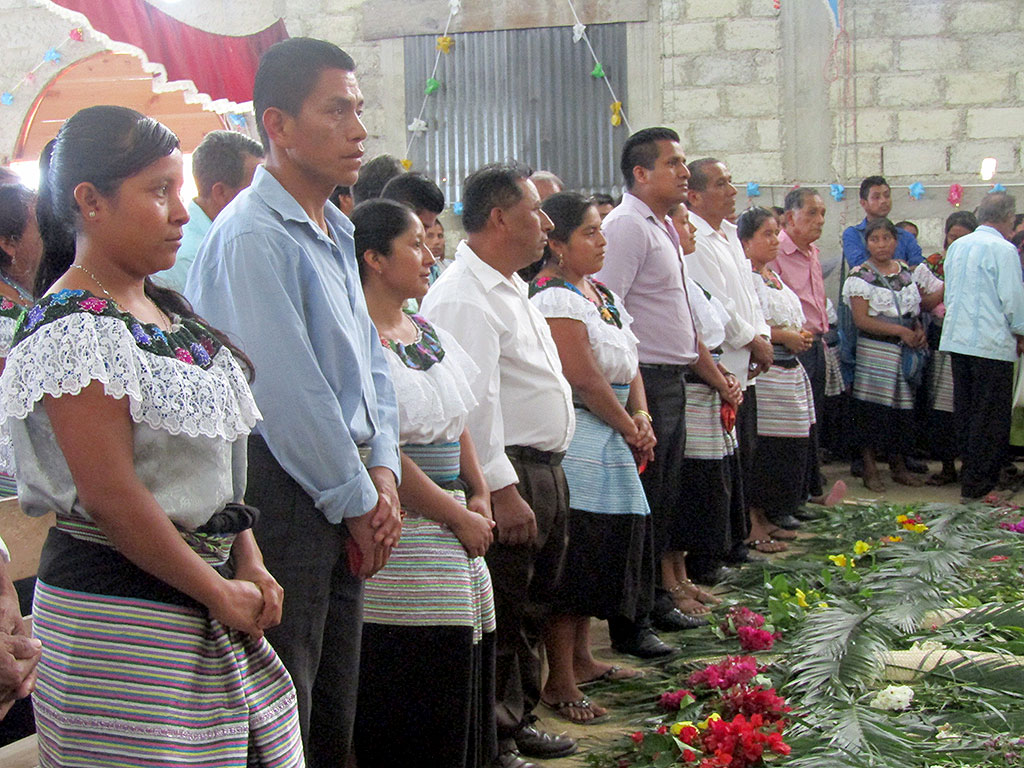
Taking office of the Council of Spokespersons of the Community Government of Chilon, May of 2018 © SIPAZ
There are five candidates who will compete for the governorship: Jose Antonio Aguilar Bodegas as a candidate of the PRD-PAN-Movimiento Ciudadano; Rutilio Escandon Cadenas for MORENA, the Partido del Trabajo (PT) and PES; and Jesus Alejo Orantes Ruiz, independent candidate. At the end of May, the coalition between PRI and Greens split when the Greens decided to name their own candidate, Fernando Castellanos Cal y Mayor, who until then was mayor of Tuxtla Gutierrez. Initially, the Electoral and Citizen Participation Institute (IEPC in its Spanish acronym) denied entry to his candidacy for failing to comply with the requirement to leave office 120 days before the election. However, the Electoral Court decided to make way for the candidacy of the Greens, Chiapas Unido and Mover a Chiapas. Roberto Albores Gleason was the candidate of the PRI and Nueva Alianza.
As for municipal elections, in April, the Movement in Defense of Life and Territory (MODEVITE in its Spanish acronym) presented those who were elected through the System of Customary Law to the Council of Spokespersons of the Community Government of Chilon and Sitala. Since last November, it has submitted an application with more than 3,000 signatures of support before the IEPC. In the absence of a favorable response, it filed a new appeal with the Federal Electoral Tribunal in Veracruz, which ordered its counterpart in Chiapas to rule on the constitutionality of the request.
Another case has been Oxchuc. In April, the Congress agreed that the municipal elections in July will be suspended until the National Institute of Anthropology and History (INAH in its Spanish acronym) finalizes the ruling to determine whether the elections through Customary Law proceed. The president of IEPC recognized that holding elections through Customary Law “is a right that all the original peoples of the country have (…) but for this they have to be subject to all the requirements that are established in the law.” He affirmed that “in Chilon, Sitala and Rincon Chamula constitutional elections will be held and based on the system of political parties because, in the case of the first two municipalities, they did not accredit having the representation of their different peoples; in the third, the municipal council’s intention is to perpetuate itself in power.” He recognized that “since 1994 there has been this demand of indigenous peoples for autonomy to be respected and part of it is that they have the possibility to elect their authorities based on their Customary Law.”
Highlands of Chiapas, Conflict Spreading to More Municipalities
“Armed civilian groups, of paramilitary nature, linked to organized crime networks, attack communities with firearms, with the permission and protection of the authorities of the government of Chiapas. Old agrarian conflicts are managed according to political interests, in an electoral environment of manipulation and control to operate renewed counter-insurgency strategies,” denounced the Fray Bartolome de Las Casas Center for Human Rights Center in the aftermath of the upsurge in violence in the Highlands in March. It mentioned that since February “different communities of the municipality of Aldama located in the territorial limits with the (…) municipality of Chenalho have been victims of attacks with firearms.” The attacks have caused new displacements and several communities have not tended their crops. This situation derives from a territorial conflict of 60 hectares between both municipalities since 1977.
In March, four months after more than 5,000 people from the communities of Chalchihuitan and Chenalho were forced to move due to a territorial dispute for more than 40 years between both municipalities, the displaced from Chalchihutan reported that they remain in inhuman conditions and continue to experience fear of gunshots that have not stopped. For those dates there were ten camps with a total of 1,094 people.
In May, the Believing People of Simojovel denounced that the candidate for the municipal presidency for the Chiapas Unido party threatened the Believing People and the parish priest Marcelo Perez Perez through Facebook in a publication that suggests that he is linked to an organized crime gang called “Los Rojos”. They warned that “Simojovel is the mirror of what happens in many municipalities, so we invite the entire population of Chiapas to remain vigilant and begin a process of peaceful organization so that organized crime does not enslave the people, we will not allow Chiapas to become a state like Guerrero or Michoacan.”
OAXACA: Struggles in Defense of the Earth and Territory
In February, the Second State Encounter of Peoples, Communities and Organizations took place, “Here we Say Yes to Life, No to Mining”, to “continue to strengthen our organizational processes.” “The persecution and murder of defenders of human rights, as well as the strategies of violence that companies and the government have used to generate a climate of terror and fear to reduce the struggle of the communities and to control the territory where mining deposits exist through organized crime” was denounced.
In March, community authorities presented the Internal Regulation of Paso de la Reyna ejido in Jamiltepec, which seeks to protect its territory, communal property as well as its way of life and organization, while facing the threat of a dam being built. Article 88 states that “the implementation of programs, projects, and investments that jeopardize the common natural assets of the ejido, the lives of the people who inhabit the ejido, as well as their integrity, is strictly prohibited.”
In April, communards of Union Hidalgo rejected the start-up of a consultation process that the Secretary of Energy (SENER in its Spanish acronym) wanted to promote in favor of a subsidiary of the French electricity company EDF for the construction of a wind farm. They explained that “it should not start in a scenario of breaking community social fabric” after the September 2017 earthquake that affected 80% of homes. They questioned that SENER already granted a 30-year permit to EDF in 2017, making the consultation that is to be initiated inconsistent with the “previous” character that is established in international texts ratified by Mexico on the rights of indigenous peoples. SENER reported the suspension of the indigenous consultation immediately.
Multiple Delays in Human Rights Issues
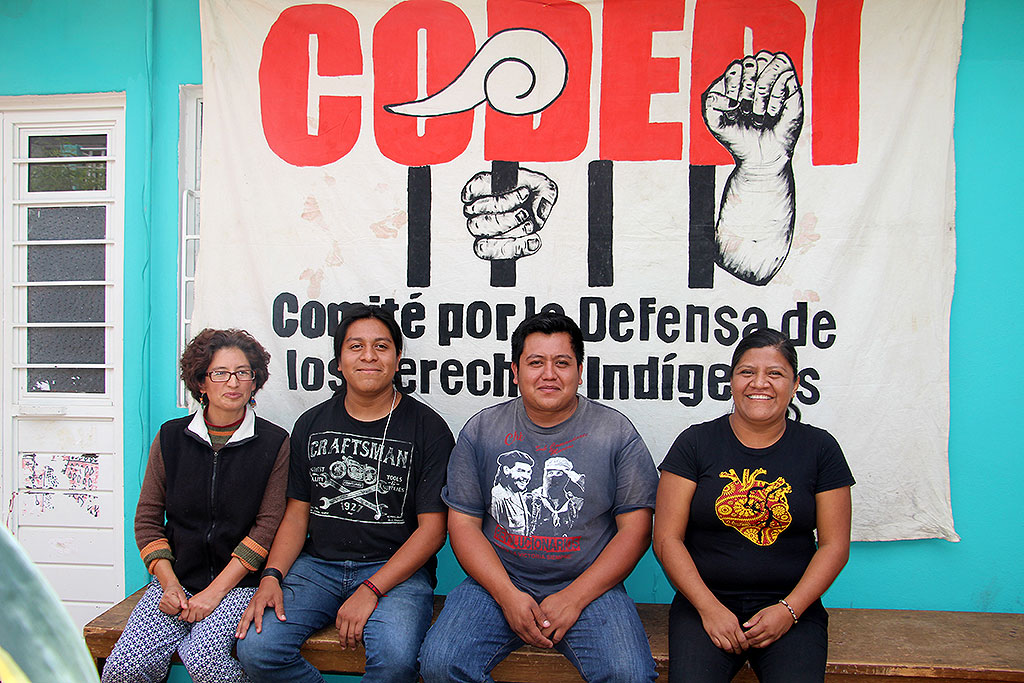
Committee for the Defense of Indigenous Rights (CODEDI) © Fray Bartolome de las Casas Human Rights Center
In April, the “Caravan of the Forgotten”, formed by 500 members of the General Coordination of Victims of the Isthmus of Oaxaca traveled to Mexico City to demand a complete census of the people affected by the earthquakes of September 2017. The Indigenous Zapatista Movement Agrarian (MAIZ in its Spanish acronym) stated that “it is also a protest against corruption, political conditioning and lack of commitment and capacity on the part of the state government.”
Another issue of concern continues to be impunity, a source of new attacks in most cases. In March, the Committee for the Defense of Indigenous Rights (CODEDI in its Spanish acronym) reported that, for demanding the clarification of an armed attack in which three of its members died last February, it has been intimidated. In May, it denounced “the omission by the state, who instead of conducting a serious investigation to find the whereabouts of the perpetrators and intellectual authors, reward them with public office and only drag the matter out prioritizing their electoral farce.”
In April, the president of the Committee of Victims of Nochixtlan (COVIC in its Spanish acronym) was found in his home, tied up and with signs of torture, having being attacked by unknown persons. The National Coordinator of Education Workers (CNTE in its Spanish acronym) blamed the attack on “the municipal and state governments, also accused of preventing the continuation of the investigation of the violent events of June 19th, 2016, where eight people died and more than 100 were wounded” in police repression of the teachers’ movement.
In April, the Oaxacan ombudsman said he will file a complaint against the former presidents Vicente Fox and Felipe Calderon, the former governor of Oaxaca, Ulises Ruiz and a dozen senior officials for crimes against humanity during the socio-political conflict of 2006 and 2007, before the International Criminal Court. He said that the actions of the government followed a “systematic and generalized pattern (…) as a strategy to contain social protest.” It specifically reported “serious crimes, in particular murders, tortures and forced disappearances” that after 12 years, “remain in total impunity.”
GUERRERO: “A Crucified People”
In the bulletin in April entitled “A Crucified People“, the Tlachinollan Mountain Human Rights Center denounced the serious situation in which the state is, stating that “both the police and the navy and the army are not guarantees for a population that distrusts them, because their actions do not result in greater security. On the contrary, the number of violent deaths has increased, despite the fact that the number of troops in the most convulsive municipalities in the state has increased. This scourge is only part of the ordeal suffered by the people of Guerrero. The official statistics that place us as the second poorest state in the country show us clearly a state that has been governed by political groups that have used the institutions for their own benefit “.
The case of the 43 disappeared students of the Normal Rural School of Ayotzinapa in 2014 continues without advances. In March, the UN High Commissioner for Human Rights presented the report “Double Injustice”, which analyzes the investigations of the case. Of the 129 people who were arrested, he found “strong elements of conviction about the commission of torture, arbitrary arrests and other human rights violations.” He urged the government to bring to justice those responsible for these abuses, as well as their superiors. He also called for evidence obtained under torture to be dismissed. In May, relatives of the 43 and their legal representatives warned that the government intends to shelve the investigation before a possible change in the presidency. “What we are looking for is for the Ayotzinapa case to be evaluated among all of the more than 30,000 people who have disappeared in Mexico in the last six years. And what we propose is that Ayotzinapa is a clear example of this phenomenon of macro-criminality in which there is a clear link between organized crime and public power, which becomes one”, the Miguel Agustin Pro Juarez Human Rights Center stated.
Two recent cases continue to nurture the concern regarding the protection of human rights defenders in the state. In March, Maria Luisa Ortiz Arenas, a member of the State Network of Feminist Activists, was murdered. The Attorney General’s Office will investigate her death under the femicide protocol. The state has registered at least 40 femicides this year and the investigation protocol has not been followed up regarding these and impunity persists, women’s organizations reported.
On another note, in the framework of the trial of 25 members of the Council of Ejidos and Opposition Communities to La Parota DAM (CECOP in its Spanish acronym) and the Regional Coordinator of Community Authorities-Community Police (CRAC-PC in its Spanish acronym), arrested in January 2018 in La Concepcion, hearings were held in April during which the conditions of their internment were verified. The Judge who reviewed the case ruled to respect the right to adequate conditions of internment of said prisoners. Several civil organizations have indicated that the clashes in January “were due to the inter-community tension promoted by state and private agents to stop the defense of the territory of their communities and the Papagayo River against the construction of the hydroelectric dam “La Parota”” and that “several CECOP members have been subject both to the factional use of the criminal justice system and to attacks against them since 2003.”

